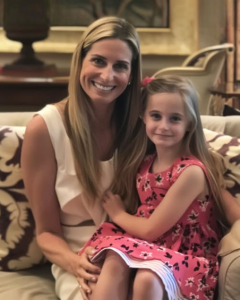My Sister Gave Up Her Adopted Daughter After Having a Biological Son — If Only I Knew She Would Answer for This Immediately
I never thought I’d see the day when my sister — my best friend, my other half — would become a stranger. But it happened, and it happened the moment she turned her back on the little girl who once called her “Mommy.”
Her name was Amira. She was five years old when my sister adopted her. A bubbly, wide-eyed child with a laugh that could light up any room. She had come from a broken foster situation, having already endured more pain than most adults ever will. But when my sister and her husband adopted her, they promised her forever.
Forever lasted two and a half years.
“We Just Want a Family”
When my sister, Cara, first started the adoption process, she was radiant with hope. She and her husband had struggled for years with infertility. I held her hand through miscarriages, late-night cries, and countless doctors’ appointments. Adoption was their silver lining — their path to parenthood.
“We don’t care if the child is biologically ours,” she once said. “We just want to love a child who needs us.”
And they did. At first.
Amira was everything they wanted — playful, loving, and surprisingly resilient. She called them Mommy and Daddy within a week. She drew them crayon hearts and whispered “I love you” before bedtime.
But then everything changed.
The “Miracle Baby”
Just after Amira turned seven, Cara called me in shock: she was pregnant. Naturally. No IVF. No treatments. A surprise after years of heartbreak.
Everyone was overjoyed. We threw a baby shower. Amira helped paint the nursery. She even picked out the baby’s name: Leo.
But after Leo was born, something shifted. Subtly at first.
Cara stopped calling Amira her “firstborn” and began referring to her as “our little helper.” She would post pictures of Leo with captions like “My world,” while Amira stood just outside the frame, holding a bottle or watching from the corner.
At family events, people cooed over the baby and forgot to say hello to Amira. I noticed. So did she.
The Cold Drift
It got worse fast.
Cara complained that Amira was acting out — that she was being “jealous,” “disruptive,” “difficult.” She claimed Amira no longer fit into their new routine.
I asked her once, gently, “Are you sure it’s not just an adjustment phase?”
Her face hardened. “You don’t understand, she’s not like Leo. It’s…different.”
That’s when the words hit me like ice:
“She’s not really ours.”
I argued. I begged. I reminded her of all the nights Amira crawled into their bed after nightmares, all the hugs, the birthday cakes, the handmade Mother’s Day cards.
But Cara had already made up her mind.
“We Found Another Home for Her”
That was how she told me.
Not we’re struggling. Not we’re seeking help. Just: “We found another home for her.”
Apparently, some family from a church group was “willing to take her in.”
Willing — as if Amira were a burden to bear, not a daughter to love.
I asked to speak to Amira. Cara said, “It’s better if we just cut ties. For her and for us.”
I broke down. I screamed. I offered to take Amira myself. But by then, the papers were signed. It was done.
The Immediate Reckoning
What happened next felt like karma — fast and unforgiving.
Leo began having unexplained seizures at just 10 months old. Doctors ran every test they could. The diagnosis came heavy: a rare neurological disorder requiring constant care and lifelong supervision.
Suddenly, the “perfect life” Cara had rebuilt without Amira crumbled.
Sleep vanished. Medical bills skyrocketed. Her husband, unable to cope, left.
And Cara — once proud, once radiant — stood alone in the ruins.
I wanted to say “I told you so.” But I couldn’t. Because what haunted me more than anything was what she did to that little girl.
Guilt, and What Came After
One night, Cara showed up at my doorstep with Leo in her arms and tears in her eyes.
“I made a mistake,” she whispered. “I didn’t just give up on her. I gave up on myself.”
She told me everything: how Amira cried and begged to stay. How she had asked, “Is it because I’m not from your belly?”
How she stopped smiling the day she left.
“She’ll never forgive me,” Cara said. “And I don’t blame her.”
I Tried to Find Amira
It took months.
The couple who took her in had since moved. There were privacy laws, closed records. But I didn’t stop searching. I hired a private investigator. I followed every lead.
Eventually, I found her.
She was 10, living with a foster family again after the second adoption failed. The couple had separated, and Amira had been placed back into the system.
I was shattered.
When I finally saw her again, she didn’t run to me. She stood cautiously, clutching a book, her eyes wary.
But then she asked quietly, “Do you still remember me?”
“I never forgot you,” I said, hugging her as tightly as I could. “And I never will.”
A New Chapter
Today, Amira lives with me. Legally. Permanently. She’s thriving in school, going to therapy, and slowly learning to trust again.
Cara visits sometimes — with Leo, whose condition has stabilized. Their relationship is delicate. There are tears, apologies, silences. But Amira sets the pace.
“Love is a choice,” she once told Cara during a visit. “You didn’t choose me. But she did.”
She pointed to me.
The Lesson We All Learned
Families aren’t made by blood. They’re made by commitment. By showing up. By staying.
Cara thought biology would fulfill her, but in choosing one child over another, she lost both — and had to rebuild from nothing.
I can’t undo what was done. But I can give Amira what she was always owed: a mother who will never, ever leave her behind.

